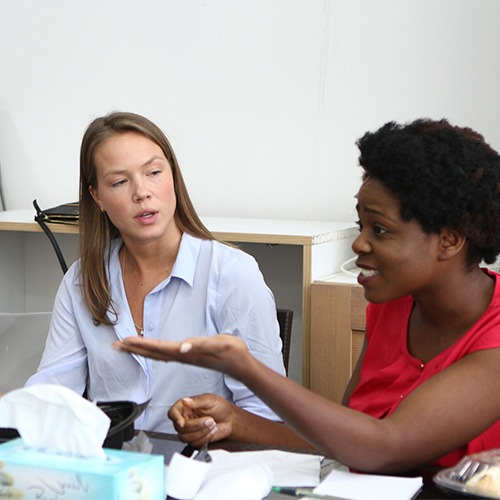Why Employing More Women Makes Business Sense
On International Women’s Day we focus on gender equality in the work place but this is not simply the right thing to do – it makes sense from a business perspective too
The theme for United Nations’ International Women’s Day, today on 8 March, focuses on Women in the Changing World of Work: Planet 50-50 by 2030. I am really fired up about what we as companies and individuals should be doing in the way of work and our workplaces – so much that today I will be delivering training and discussing the issue of equality at work with my colleagues.
As part of this, I am showing a few videos – this one from Emma Watson is just amazing and she finishes with truly awful statistics. If we do nothing to change the rate of change, it will be 75 years before women receive the same pay as men for the same work; and 2086 before rural African girls all get a secondary education.
Here I want to cover what we can do individually (this is through the #HeforShe campaign that Emma refers to) and what corporates can do – by signing up to the UN’s principles of women empowerment.
If you go to the UN’s website, you can find their seven empowerment principles, ranging from the need for leadership to be committed to gender equality, to measuring and publicly reporting on gender equality progress. When you read these principles, they seem – dare I say it – rather obvious. It would be hard for anyone to argue with any of these. Yet if they seem so straightforward and sensible – why is the world so far off achieving any of these?

I think there are two key issues. While gender balance feels ‘the right thing’ to do, have we really shown it makes for better business and performance? And even if leaders believe that more equality at work is a good thing, how do we ensure there is a good pool of excellent candidates for the top jobs? No-one wants to see women recruited as ‘tokens’ in leadership teams or boards.
I have two stories in our own business that demonstrate the business case for employing women and then want to consider this tricky problem of there not being enough good female candidates for the top positions. Supposedly.
The first story is of Ilham Gassar, who is working for CTG in Somalia. Ilham’s story features in a BBC podcast by Andrew Harding for their From our Own Correspondent (the piece starts at 12:40 minutes and Ilham’s story at 15:05).
This extraordinary 32 year-old woman fled Somalia in 1992 and grew up in the UK. When she first went back to Mogadishu in 2012, her own relatives sent gunmen to hunt her down and kill her, wrongly thinking she had political ambitions. Trying to escape at the airport, officials held her and took her passport, hoping to give the gunmen another chance. She swore then never to return.
But this year she was back, having patched things up with relatives and initially planning to stand for election. However, according to Harding’s report, the election was a ‘corrupt joke’ with parliamentary seats being auctioned to the highest bidders – some for tens of thousands of dollars, a few even for a million dollars. So she has abandoned this route for now.
She still wants to make a difference to her country and is doing this by working with us at CTG. Her role is advising senior parties of the international community in the political and social developments of South Central Somalia. Ilham is exactly the sort of woman who I believe will help Somalia rebuild a sustainable country. She is courageous, visionary and wants to build a positive future – without war.
This reflects what I see so much of in our work – I have already written about the importance of women in this blog on Rural women are the key to transforming war-torn countries.
None of this is about wanting women to take over, but using the strengths of what happens when men and women work together.
My second story makes the point about the weakness of just one gender working on projects. A while ago, we had a team within our business where it was all women. I noticed that there were power struggles and small conflicts going on in the team – they were strong women and quite fractious. We purposely recruited a man to join them and the dynamics of the team changed almost overnight. The culture became more collegiate and focused on their tasks, rather than playing games in the office.
Men and women working together bring out the best in each other.
And that brings us to the subject that men complain about at the moment. The battle has mostly been won that businesses need more women around the leadership and boardroom tables – if only because all male boards are now beginning to look rather dated. However, headhunters and chairmen complain that they can’t find enough good women for shortlists.
This is partly a time issue. Because fewer women have gone through the ranks to top executive positions, there are currently not as many obvious candidates for these roles.
I was interested in a story in Lubna Qassim’s blog on the governance aspect of gender equality. She mentions hearing of a leading global banker who wanted more diversity on his leadership team. He had spotted a bright woman who, in theory, did not tick all the criteria they wanted for the Head of a division – but he insisted on interviewing her and she got the job. Apparently he was challenged by colleagues for giving a woman such a step up but he was unapologetic and adamant that a few brave moves will have to be made to achieve change.
One of the challenges for headhunters is to start ‘fishing in new pools’ for talent. There are talented women out there who can lead and help bring new perspectives – but they don’t always quite fit the image of traditional leaders.
So for this year’s International Women’s Day, my hope is that women themselves take up more leadership roles, such as Ilham Gassar is doing, that headhunters become a little braver in looking for the talent to fill our leadership roles – and that companies sign up to the Women’s Empowerment Principles (WEPs).
In the meantime, I would love you to watch a video by Adam Bain, COO of Twitter, who talks about wanting the same opportunities and equality for his son and his daughter. It is men like Adam who will help change mindsets and I hope all of us can look at our own workplaces and think – what can I do? Now. And then sign up for the WEPs, here.



